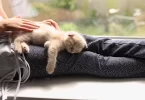Caring for a cat involves more than just feeding and providing shelter. To ensure your feline friend lives a long, healthy, and happy life, it’s crucial to understand what actions can be detrimental. Here are ten critical things you should never do to your cat, along with practical advice to keep your pet thriving.
1. Neglect Their Emotional Needs

Cats are sensitive creatures who require emotional stimulation and interaction. Neglecting their need for companionship and play can lead to stress and behavioral issues. Regular interaction, including playtime with toys and gentle petting, helps prevent anxiety and keeps your cat mentally stimulated.
2. Administer Physical Punishment
Unlike dogs, cats do not respond well to physical punishment. Techniques like hitting or yelling can cause fear and anxiety, damaging the bond between you and your pet. Instead, use positive reinforcement by rewarding desirable behaviors with treats and praise. This approach fosters trust and encourages good behavior.
3. Ignore Routine Veterinary Check-Ups
Routine veterinary visits are vital for maintaining your cat’s health. Even if your cat appears healthy, regular check-ups can detect underlying issues early. Ensure your cat is up-to-date on vaccinations, flea treatments, and dental care by scheduling annual vet appointments.
4. Feed Inappropriate Foods

Feeding your cat dog food or human food can lead to nutritional imbalances and health problems. Cats require specific nutrients that are found in high-quality cat food. Avoid offering scraps or treats that are not formulated for feline dietary needs to prevent obesity and other health issues.
5. Use Harsh Cleaning Products
Harsh chemicals and cleaning products can be toxic to cats. Always use pet-safe cleaning supplies and ensure that any chemicals are thoroughly rinsed and dried before your cat has access to the area. This prevents accidental ingestion or exposure that can lead to serious health problems.
6. Ignore Their Grooming Needs

While cats are generally good at grooming themselves, they still need help maintaining their coats. Regular brushing helps prevent matting, reduces shedding, and minimizes hairballs. For long-haired breeds, daily brushing is essential to avoid painful tangles and ensure their coat remains healthy.
7. Withhold Access to Fresh Water
Hydration is crucial for your cat’s health. Never withhold access to fresh water, as it can lead to dehydration and urinary tract issues. Ensure your cat always has a clean water source and consider using a cat water fountain, which encourages drinking by providing running water.
8. Neglect Their Litter Box Needs

A clean litter box is essential for your cat’s well-being. Neglecting to scoop or clean the litter box regularly can cause stress and result in inappropriate elimination. Ensure the litter box is cleaned daily and that there is at least one box per cat in your household.
9. Ignore Socialization and Enrichment
Cats require social interaction and environmental enrichment to stay mentally and physically healthy. Avoid isolating your cat or leaving them in a monotonous environment. Provide a variety of toys, scratching posts, and climbing structures to keep your cat entertained and engaged.
10. Expose Them to Hazardous Plants

Certain houseplants and garden plants are toxic to cats. Common examples include lilies, poinsettias, and philodendrons. Keep these plants out of reach or choose cat-safe alternatives to prevent poisoning. If you suspect your cat has ingested a toxic plant, contact your veterinarian immediately.
Conclusion
Understanding what not to do is as crucial as knowing the best practices for cat care. By avoiding these ten actions, you can create a safe, nurturing environment for your feline companion. Prioritize their emotional and physical needs, and your cat will reward you with love, affection, and a happy, healthy life.





